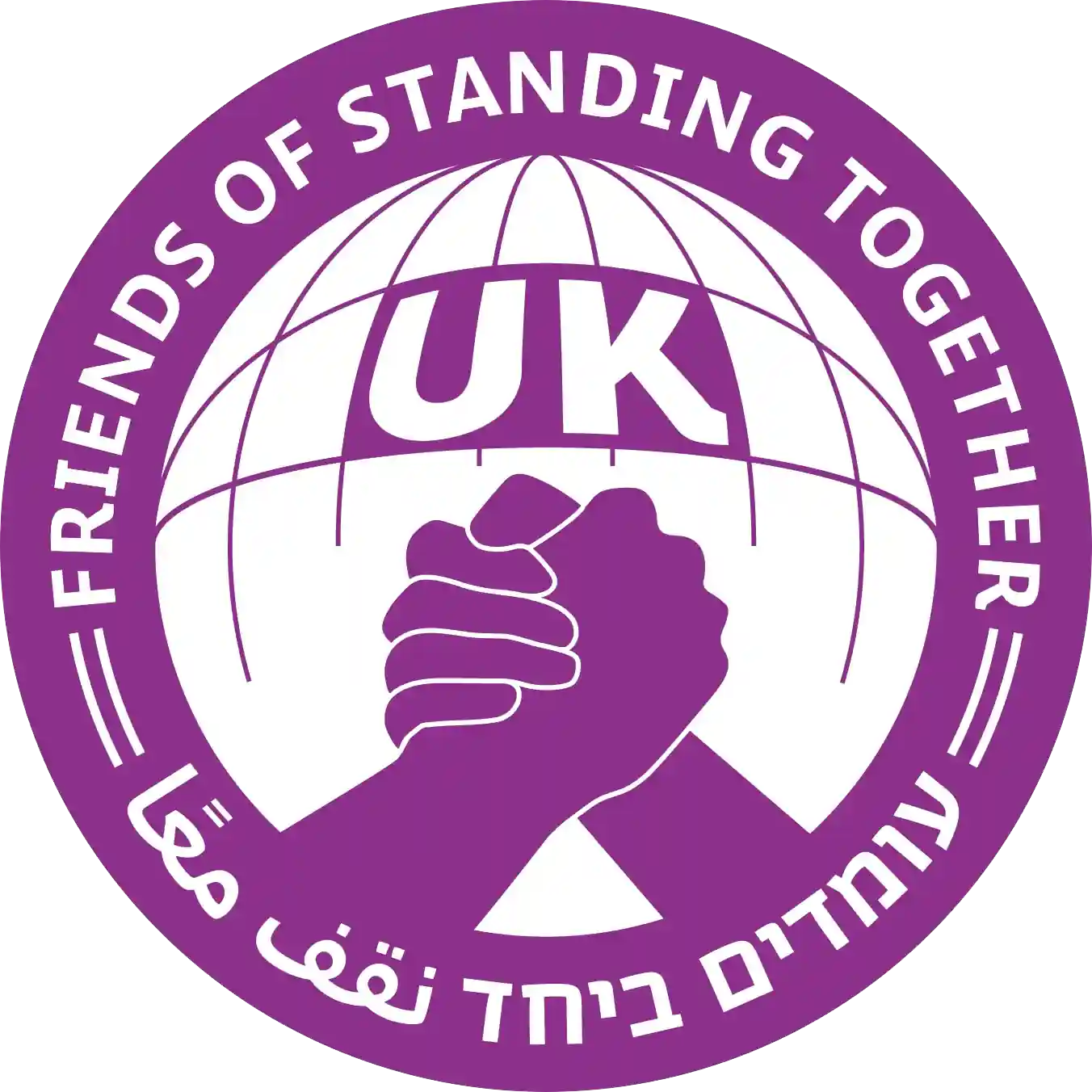Interview with Standing Together leaders in Aslef journal
The November edition of the journal of the Associated Society of Locomotive Engineers and Firemen (Aslef), a train drivers’ union, includes an interview with two Standing Together leaders. Aslef is one of two trade unions to have passed policies supporting Standing Together’s work at national level.
A transcript of the interview is below the image.

As the war in Gaza and Lebanon shows no signs of ending, more than a year since the Hamas attack on Simchat Torah, TIM VAN TINTEREN, Sheffield Midland branch secretary, asks Sally Abed, national co-ordinating team, and Uri Weltmann, national organiser, of Standing Together, a progressive and inclusive new grassroots movement in Israel, what they hope to achieve in their country.
Can you introduce ASLEF members who might not be aware of Standing Together to the movement?
Sally: Standing Together is a grassroots political movement of Jewish and Palestinian citizens of Israel, that organises and mobilises for peace, equality, and climate and social justice. Grounded in socialist values, we work to build a new majority inside Israeli society that would allow us to advance these values.
What are the main focuses of your current activity?
Uri: Since 7 October 2023, Standing Together has been the prominent voice inside Israel fighting for a ceasefire agreement, that would end the killing of innocents in Gaza, return the hostages back alive to their families, and end this bloody, criminal, war with a focus on an alternative of ending the occupation and peace. In addition to organising around this and fortifying our growing chapters across the country, and on campuses, we have been raising the alarm about the ongoing humanitarian catastrophe unfolding in the Gaza Strip and the West Bank, and organised activists to help defend aid trucks carrying food to Gaza from violent attacks by far-right West Bank settlers.
Does Standing Together have any relationship with the trade union movement in Israel?
Sally: The labour movement in Israel is dominated by the Histadrut – the traditional trade union federation, formed more than a 100 years ago, which was, at the time, an exclusively Jewish workers’ organization. It has been hesitant to defend the rights of Arab-Palestinian workers, and has not taken up a consistent position in support of Israeli-Palestinian peace. When we launched, three years ago, a campaign to raise the minimum wage, we clashed with the Histadrut leadership about eroding the minimum wage in the face of growing inflation, but we do collaborate with Power to the Workers, a much smaller trade union organisation, formed in 2007 and based on workers’ democracy, which mainly organises precarious workers.
In February, two Standing Together leaders were elected to municipal councils in Tel Aviv and Haifa as part of broader left-wing electoral initiatives. How does Standing Together’s role as a social movement intersect with electoral politics?
Sally: In Haifa, a joint Jewish-Arab slate of candidates called The City’s Majority won 3% of the votes and I was elected as the movement’s sole city councillor. In Tel Aviv, a joint Jewish-Arab slate called Purple City joined with others of the left for a broad alliance that won 7.6% of the vote and elected three city councillors, one of them Itamar Avneri. Both these were organisationally, financially, and legally independent from Standing Together, but very much ideologically incubated by our brand of politics. We believe in pursuing an inside and outside strategy that both builds power in the grassroots level, and intervenes directly inside the political institutions.
Before the war, Standing Together often campaigned around basic class issues such as wages and housing. What potential do you see for re-energising campaigns around these issues alongside, and through, your agitation against the war and occupation?
Uri: Our most urgent priority is to end the war. There cannot be any serious progress on social and economic questions while the war rages, and more and more budgets are allocated for military expenditures, as well as the consolidation of the settlement project in the Occupied West Bank and East Jerusalem. Local municipal movements – affiliated with our purple brand of politics – continue to campaign around social, community, and environmental issues in Haifa and Tel Aviv, engaging our base and broadening support for our ideas.
What can ASLEF members, and other UK trade unionists, do to support your work?
Sally: An organisation called UK Friends of Standing Together was set up last December, with a presence on the street and on social media. Some trade unionists have already engaged with UKFOST, helping to get news of our work across to people from the labour and peace movements. We very much believe in this sort of dialogue, and exchange of experience, and look forward for ASLEF branches reaching out for discussion, something that nowadays is made much easier by technology.
What do you say to ASLEF members or others in the Palestine solidarity movement who find the PACBI statement against Standing Together persuasive? It’s ASLEF policy to support the Boycott, Divestment & Sanctions movement. Is support for Standing Together incompatible with that?
Uri: Standing Together is a movement that operates inside Israeli society, with the aim of talking with and convincing people around us. Naturally, if your point of view is that people who have Israeli citizenship don’t need to be engaged with, and that it is not worthwhile to even try to build among them support for ending the war and the occupation, then our work might seem superfluous to you. If, however, you recognise, like us, that there are millions of Jewish-Israelis in our country, and none of them are going anywhere, and there are millions of Arab-Palestinians, and that none of them are going anywhere, then it becomes clear why it is important to build a force on the ground that convinces the unconvinced, and works to change the political weather. Efforts such as ours need solidarity, not boycotts.

